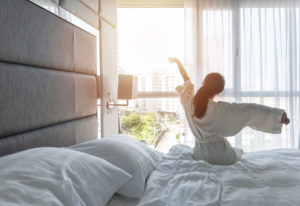Past research studies have demonstrated the potential of a two-way link between a disrupted circadian rhythm and the presence of anxiety. Once you have a better understanding of these two elements, you will be able to see why anxiety and sleep are so closely linked in many cases.
Understanding Anxiety
 To fully comprehend the relationship between anxiety and sleep patterns, it’s important to understand anxiety as a stand-alone mental health issue. There are different types of anxiety, including separation anxiety disorder, social anxiety disorder and generalized anxiety disorder.
To fully comprehend the relationship between anxiety and sleep patterns, it’s important to understand anxiety as a stand-alone mental health issue. There are different types of anxiety, including separation anxiety disorder, social anxiety disorder and generalized anxiety disorder.
Regardless of the type and scope of the anxiety, the disorder presents when a person experiences a larger-than-expected amount of stress from a situation or event. People who suffer from anxiety report feelings of worry, stress and fear. Treatments for anxiety encompass a wide range of lifestyle changes and medications.
What is Insomnia?
Insomnia is defined as a sleep disorder in which an individual has trouble falling asleep, staying asleep or both. Acute insomnia is usually the result of overwhelming stress or anxiety and is generally a temporary condition. Chronic insomnia is more serious and may require medical treatment to alleviate the problem.
People who suffer from the chronic form of insomnia have a higher likelihood of also experiencing certain types of mental health issues such as anxiety and depression. Many sufferers of insomnia also deal with other types of sleep disorders such as sleep apnea.
The Relationship Between Sleep and Anxiety
When looking at the dynamic between anxiety and sleep, it is clear that the two are often intertwined. While establishing the relationship between the two, it becomes the classic question of what came first, the chicken or the egg?
Insomnia can be a symptom of anxiety or it can also be a precursor to anxiety. This uncertainty can make it challenging to understand how to best treat the issue. Studies have also reported data that demonstrates a one-way relationship in which the presence of anxiety may predict the incidence of depression. This further compounds the close connection between sleep and anxiety.
The Importance of a Good Night’s Sleep
With an understanding of the complex nuances of anxiety and insomnia, the importance of getting a good night’s sleep is evident. Being intentional about getting quality sleep each night is one of the best things that you can do for both your physical and mental health.

Conversely, getting enough sleep each night will provide a host of benefits to every aspect of your health and life. Good sleepers enjoy greater levels of productivity, mental clarity and concentration, better athletic performance and stronger immune function.
Natural Ways to Get Your Sleep
You do not need to resort to disruptive medicines or other types of treatment to ensure that you get a good night’s rest. Here are four natural ways that you can help your body to get the sleep that it needs to combat anxiety and face the day with renewed vigor.
Warm Milk and a Snack
The classic cure of a warm mug of milk delivers a dose of goodness to the body while relaxing the mind and preparing it for sleep. You should also not go to sleep overly full or hungry as this will disrupt your rest patterns. Good snack choices to include as part of your bedtime routine incorporate a combination of protein and carbohydrates, such as pairing a banana with peanut butter or whole-grain crackers with a slice of cheese.
Tranquil Surroundings
You can boost your odds of falling into a deep sleep if you create a tranquil place to rest. This means eliminating electronics or other types of distractions. Some people find success with a white noise machine to block out peripheral noise. You may also try reading a book to prepare the body for slumber.
Hot Bath
Taking a hot bath shortly before bedtime is a natural relaxant. You can enhance this experience by adding a little lavender essential oil to the water. Lavender has been shown to calm the body and mind, making it a natural fit for your bedtime routine.
Melatonin
This supplement is the gold standard when it comes to regulating sleep. This hormone occurs naturally in the body, making it a safe alternative to encourage regular sleep cycles.
It has become increasingly clear that anxiety and sleep are closely intertwined. By understanding how the two relate to each other, you can take the steps to alleviate this mental and emotional burden so that you can put yourself on the path to better sleep.







